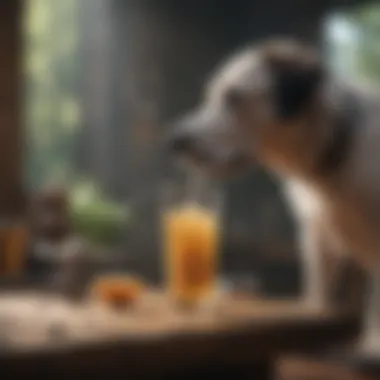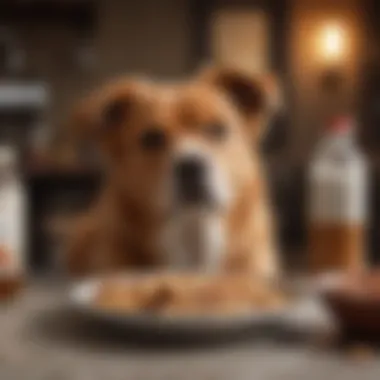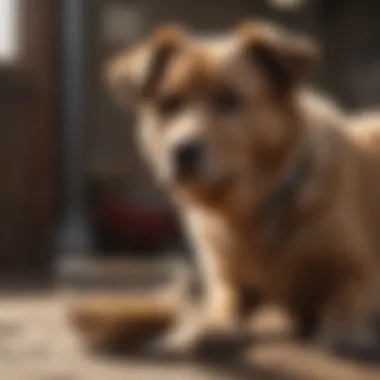Essential Feeding Guidelines for Dogs with Diarrhea


Intro
Managing a dog's health during episodes of diarrhea is crucial for both the pet and the owner. Understanding how to change feeding practices can significantly impact recovery. This article seeks to provide pet owners with actionable guidelines for feeding dogs dealing with diarrhea. By focusing on specific nutritional strategies, you can ensure your dog's digestive health is restored effectively while also maintaining overall well-being.
Understanding Your Pet
When a dog exhibits signs of diarrhea, it becomes essential to assess their individual needs. Factors such as breed traits, common temperaments, and special dietary needs should influence feeding choices. For instance, some breeds might be more prone to gastrointestinal issues, making them susceptible to nutritional disturbances.
Breed Traits
Different dog breeds exhibit varied characteristics, including their digestive systems. Certain breeds, like Bulldogs and Boxers, may have more sensitive stomachs compared to others. Recognizing these traits helps in selecting appropriate food during diarrhea. Small breeds frequently require smaller portions more frequently, while large breeds might cope better with less frequent but larger meals.
Common Temperaments
A dog's temperament influences their feeding habits. Some dogs may be eager to eat, regardless of their digestive condition, while others may resist food entirely. Understanding your pet's behavior enables you to tailor your feeding approach. A dog that is prone to anxiety may need more attention during meal preparation to ensure they feel secure and comfortable.
Special Needs
Dogs with pre-existing health conditions like diabetes or pancreatitis may require more careful diet modifications. Consult your veterinarian before making sudden changes. This insight is vital for ensuring that dietary adjustments cater to specific health conditions while addressing diarrhea.
Pet Care Essentials
Caring for a dog with diarrhea extends beyond just nutrition. Pet owners must integrate several components including grooming, health, and wellness. Ensuring your dog's comfort and hygiene can expedite recovery.
Nutrition and Feeding Guidelines
When managing diarrhea, the focus should be on providing a simple, easily digestible diet. Key considerations include:
- Bland Diet: Begin with boiled rice, plain boiled chicken, or pumpkin to soothe the digestive system.
- Frequent Meals: Smaller, more frequent feedings can help in digestion.
- Gradual Introduction: As the pet improves, gradually reintroduce their regular food to prevent further digestive upset.
Grooming Tips and Techniques
Maintaining hygiene during this time is important. Ensure your dog's rear end is clean post-defecation to prevent irritation. Regular bath times may become necessary to keep the dog feeling comfortable.
Health and Wellness
Stay vigilant for signs of dehydration. Ensure fresh water is always available and consider electrolyte solutions specifically formulated for pets if needed. If symptoms persist for more than a day or worsen, seeking veterinary assistance is crucial.
Training and Behavior
Although training may seem unrelated, a calm approach to feeding during distressing times is vital. Positive reinforcement can help re-establish a healthy feeding routine.
Basic Training Techniques
Utilizing basic commands can reassure and guide your dog through the transition back to normal eating habits. Recognizing signs of hunger or stress will help establish a routine.
Behavioral Problems and Solutions
Some dogs may exhibit stress-related behaviors during illness. Identifying these early can assist in managing their comfort level, which includes attentiveness during meal times.
Engaging with Your Pet
Being involved with your dog’s recovery process is important. Keep interactions low-key but nurturing to help your dog feel secure during this time.
Interactive Games and Toys
Choose gentler activities. Puzzle toys that slowly dispense food can provide mental stimulation without overwhelming them.
Epilogue
In summary, addressing diarrhea in dogs requires a thoughtful approach to their diet and overall care. By being aware of your pet's unique needs and making appropriate dietary changes, you can foster a quicker recovery. Balancing nutrition and staying attentive to hydration plays a key role in restoring your dog's health. Remember to monitor your dog's condition and reach out to a veterinarian when needed.
Understanding Diarrhea in Dogs
Understanding diarrhea in dogs is crucial for pet owners who want to manage their canine's health effectively. Diarrhea can indicate a range of underlying issues, from minor dietary mishaps to serious health conditions. It is essential to identify the symptoms and causes involved. This understanding serves as the foundation for appropriate treatments and dietary adjustments.
Definitions and Symptoms
Diarrhea refers to an increase in the frequency, volume, or water content of bowel movements. Dogs experiencing diarrhea might exhibit symptoms such as:


- Frequent, loose, or watery stools
- Straining or discomfort during defecation
- Urgency to go outside
- Possible accompanying symptoms like vomiting or lethargy
It’s important to note that diarrhea can lead to dehydration, particularly if it is persistent. Recognizing these symptoms enables pet owners to take swift action if necessary.
Common Causes of Diarrhea
Diarrhea in dogs can arise from several sources. Some of the most common causes include:
- Dietary indiscretion: Eating spoiled food or new treats.
- Food allergies: Reaction to specific ingredients in their food.
- Infections: Viral, bacterial, or parasitic infections can upset a dog's digestive system.
- Medications: Some medications may have gastrointestinal side effects.
- Chronic issues: Conditions like inflammatory bowel disease or pancreatitis require ongoing management.
Understanding these causes better equips pet owners to address the issue effectively and avoid future incidents.
When to Observe Serious Symptoms
While diarrhea can be benign, it can also signal more serious health concerns. Pet owners should closely monitor their dogs for alarming signs such as:
- Persistent diarrhea over 24 hours
- Blood in the stool
- Severe vomiting
- Lethargy or weakness
- Signs of dehydration, like dry gums or excessive thirst
If any of these symptoms appear, it is crucial to seek veterinary assistance as soon as possible. Prompt attention can significantly impact the outcome of the situation.
Understanding the causes and symptoms of diarrhea lays the groundwork for effective management and feeding strategies.
By being attentive to the signs your dog displays and understanding the potential causes of their condition, you can take informed steps toward recovery.
Initial Response to Diarrhea
Dealing with canine diarrhea requires a careful and informed approach. The initial response is critical in determining how quickly and effectively your dog can recover. During this period, it is essential to monitor your pet's condition, evaluate their symptoms, and make informed decisions regarding feeding. Proper initial actions can pave the way for a smoother recovery.
Assessing Your Dog's Condition
Before making any decisions, it is vital to assess your dog’s overall health. Observe their behavior and physical state. Key aspects to consider include:
- Frequency of Diarrhea: Take note of how often your dog has bowel movements. Occasional episodes may not be alarming, while consistent diarrhea could indicate a more significant concern.
- Consistency: Determine the severity of the diarrhea. Watery stools are more concerning than soft but formed feces.
- Accompanying Symptoms: Look for signs of vomiting, lethargy, or abdominal pain.
- Hydration Status: Check if your dog shows signs of dehydration, such as dry gums or skin elasticity.
A clear understanding of these factors helps in deciding the next steps. If your dog seems otherwise healthy but has mild diarrhea, home care may suffice. Conversely, if you notice severe symptoms, it may be time to consult a veterinarian.
Withholding Food: Is It Necessary?
One commonly debated question is whether to withhold food during episodes of diarrhea. Generally, the answer is nuanced.
- Short-Term Fasting: In many cases, a short fast (approximately 12 to 24 hours) allows the gastrointestinal system to rest. During this period, ensure your dog stays hydrated to prevent dehydration.
- Gradually Introducing Bland Foods: After the fasting period, gradually reintroduce light, digestible foods. Start with bland options like boiled chicken and rice or pumpkin puree. This supports healing and helps determine how well your dog tolerates food after the upset.
- Individual Considerations: Keep in mind that each dog is different. Consult your vet for personalized advice, especially if your dog is young, elderly, or has pre-existing health issues.
It is crucial to remember that withholding food should not extend beyond what is necessary; prolonged fasting can lead to further health complications.
The initial response when your dog experiences diarrhea can greatly impact their recovery. By monitoring their condition closely and responding appropriately, you help increase their chances of returning to normal health efficiently and effectively.
Hydration Is Key
Maintaining proper hydration is critical for dogs experiencing diarrhea. Diarrhea results in rapid fluid loss, which can lead to dehydration, a serious complication that can affect a dog's health considerably. Adequate hydration supports vital bodily functions, helps regulate temperature, and promotes recovery during digestive disturbances.
Signs of Dehydration in Dogs
Recognizing signs of dehydration in dogs is crucial for timely intervention. Some common indicators include:
- Dry gums: Healthy gums should be moist. A dry mouth can signal dehydration.
- Excessive thirst: If your dog is drinking water more than usual, it may be an indication of dehydration.
- Loss of skin elasticity: Gently pinch the skin on the back of the neck. If it takes longer than normal to return to place, dehydration could be present.
- Lethargy: An unusually lethargic dog may be dehydrated or suffering from another health issue.
- Sunken eyes: Eyes may appear sunken if hydration levels are low.
Monitoring these signs is important as severe dehydration can lead to more serious health problems.
Encouraging Fluid Intake
It is essential to encourage your dog to drink fluids, especially during episodes of diarrhea. Here are some effective strategies:
- Provide fresh water: Always ensure that clean, fresh water is available. Dogs are more likely to drink when the water is cool.
- Flavor the water: Adding low-sodium broth or a splash of pedialyte can make water more appealing to your dog.
- Offer ice chips: Some dogs enjoy munching on ice, which can also keep them hydrated.
- Serve broth: Warm, low-sodium chicken or beef broth can entice your dog to drink more fluids and provide essential nutrients.
These methods enhance fluid intake crucial for your dog's recovery.
Electrolyte Solutions for Dogs
In cases of moderate to severe diarrhea, plain water may not suffice. Electrolyte solutions can help restore balance and replenish lost fluids. Consider the following options:


- Veterinary Electrolyte Solutions: Some commercial products are specifically designed for pets. Always choose those that are sugar-free and low in sodium.
- Homemade Electrolyte Solution: A simple mix can be prepared by combining water, a pinch of salt, and a small amount of sugar. This solution can help hydrate your dog and replenish essential electrolytes.
Consult your veterinarian before using these solutions to ensure they are appropriate for your dog's specific needs.
Consultation with a vet is advisable, particularly with severe dehydration, as this could require more intensive treatment.
Recommended Foods for Dogs with Diarrhea
Recommended foods for dogs with diarrhea play a crucial role in managing this common condition. The right diet can soothe the digestive tract, reduce inflammation, and encourage solid stools. Understanding the specific food options available allows pet owners to make informed choices that prioritize their dog's health during these disturbances.
A dog’s diet should be adjusted based on the severity and duration of diarrhea. Implementing easy-to-digest foods is beneficial for your pet and can aid in a quicker recovery. It is prudent to consider foods that provide essential nutrients while minimizing any further digestive upset.
Bland Diet Options
Boiled Chicken and Rice
Boiled chicken and rice is a staple recommendation among veterinarians for dogs with diarrhea. This dish is easy to digest and low in fiber, making it a preferable choice when a dog's stomach is sensitive. The plain nature of boiled chicken provides a source of protein without the risk of aggravating gastrointestinal issues.
Combining chicken with rice helps balance the protein content with carbohydrates. This combination allows for sustained energy without overwhelming the digestive system. However, owners should choose white rice, as it is easier to digest compared to brown rice.
Advantages:
- High digestibility
- Provides necessary proteins and carbohydrates
- Simple to prepare and serve
Pumpkin Puree
Pumpkin puree stands out as a beneficial addition to a bland diet for dogs suffering from diarrhea. The high soluble fiber content in pumpkin helps absorb excess water in the digestive tract, potentially easing both diarrhea and constipation. It is essential to use pure pumpkin puree, not the spiced pie filling, as many additives in those products can be harmful to dogs.
Not only does pumpkin offer digestive benefits, but it is also rich in vitamins A and C. These nutrients can support overall health. Introducing pumpkin puree gradually can have a positive impact on a dog's condition without causing additional strain on the digestive system.
Advantages:
- Absorbs excess liquid in the gut
- Rich in vitamins
- Low in calories, making it safe for weight management
Plain Yogurt
Plain yogurt can serve as a great addition to a canine diet during recovery from diarrhea. Yogurt contains probiotics, which can enhance the gut flora. Healthy gut bacteria play a role in digestion, potentially restoring balance in the intestinal tract.
When choosing yogurt, opt for unsweetened and unflavored types. Flavored yogurts often contain sugars and artificial ingredients that are not suitable for dogs. Introducing small amounts can also help test for potential lactose intolerance. Not every dog can handle dairy, so monitoring their reaction is necessary.
Advantages:
- Contains probiotics for digestive health
- Can improve gut flora balance
- Versatile and can be mixed with other bland foods
Commercial Diets and Prescription Foods
For dogs with severe cases or ongoing diarrhea, commercial diets and prescription foods may be ideal choices. These diets are specifically formulated to meet the nutritional needs of dogs with digestive issues. They often contain easily digestible ingredients and added nutrients that promote gut health. It is wise to consult a veterinarian for recommendations in this area. Many veterinary clinics offer prescription food options that cater to various dietary restrictions. This can ensure a balanced approach to recovery.
Some notable products in the market include Hill’s Prescription Diet i/d, Royal Canin Gastrointestinal diets, and Purina Pro Plan Veterinary Diets. These products have been formulated to provide optimal nutrition while minimizing gastrointestinal distress.
These recommendations are part of effective management of canine diarrhea, directly impacting the recovery process.
The right food can make a significant difference in a dog's recovery from diarrhea. Tailoring their diet to their current needs is essential.
Feeding Strategies During Recovery
Feeding strategies play a crucial role in the recovery of dogs experiencing diarrhea. Once a dog begins to show signs of improvement, transitioning back to a regular diet needs to be done cautiously. This process is significant because it can influence the dog’s overall health and digestion. Proper feeding strategies help to restore normal gut function, strengthen the immune system, and maintain energy levels during recovery.
Reintroducing Regular Diet
Reintroducing a regular diet involves gradually incorporating the usual food back into your dog’s meals. This should not be rushed. Start by mixing a small amount of the regular food with the bland diet that was previously fed during the acute phase of diarrhea. An ideal ratio is to commence with about 25% of the regular food and 75% of the bland diet. Over the course of around three to five days, increase the proportion of regular food while decreasing the bland portion. Good options for a regular diet may include high-quality kibble, or cooked meats and vegetables, depending on your dog's specific dietary needs. The gradual approach helps to monitor any potential reactions or return of symptoms.
Key Considerations:
- Quantity Control: It's important to keep meal portions standard. Smaller, frequent feedings are often better accepted than larger meals.
- Quality of Food: Choose high-quality, easily digestible food to facilitate recovery.
- Inclusion of Probiotics: Integrating probiotics may also benefit gut health during this period.
Monitoring Your Dog's Response
As you reintroduce regular food, closely observe your dog's response. Watch for any signs of discomfort, relapse, or adverse reactions. Keeping a simple log can assist in tracking changes and noting any symptoms, including frequency and consistency of stools, energy levels, and overall behavior.


It is essential to remain vigilant and responsive. If diarrhea recurs or if your dog shows indications of distress, return to the veterinarian for further guidance.
Indicators to Monitor:
- Stool Consistency: A return to firm stool is a good sign.
- Appetite Levels: An increase in appetite usually indicates improvement.
- Energy and Activity: Increased playfulness or general energy should be welcomed.
Ultimately, ensuring a measured and attentive reintroduction of food is vital for your dog’s successful recovery from diarrhea. By taking these strategies into account, you can help maintain the balance necessary for your dog's digestive system and overall well-being.
Preventive Measures for Future Incidents
Preventing diarrhea in dogs is as crucial as treating it. Implementing effective preventive measures can significantly reduce the likelihood of future incidents. These measures are based on understanding dietary needs and maintaining a healthy lifestyle for our canine friends. Furthermore, consciously avoiding potential trigger foods can enhance your dog’s overall well-being.
Maintaining a Balanced Diet
A balanced diet is essential for the health of dogs. It ensures they receive all necessary nutrients. Pet owners should focus on high-quality dog food that is appropriate for their dog’s age, size, and health status. Look for foods that contain the right mix of proteins, fats, carbohydrates, vitamins, and minerals. Supplementing with safe, dog-friendly fruits and veggies can also provide important nutrition.
To maintain a balanced diet:
- Choose a reputable brand of dog food.
- Ensure that the food meets the Association of American Feed Control Officials (AAFCO) standards for nutritional adequacy.
- Avoid sudden changes in diet to prevent digestive upsets.
Regularly assess your dog’s dietary needs. As they grow or their health status changes, their nutritional needs can shift too.
Avoiding Common Dietary Triggers
Certain foods can irritate your dog's digestive system and lead to diarrhea. Identifying and avoiding these dietary triggers is an effective preventive strategy. Common triggers include:
- Fatty foods: High-fat diets can cause gastrointestinal distress.
- Dairy products: Many dogs are lactose intolerant and may react poorly to dairy.
- Human food: Avoid giving table scraps, especially those high in fat, salt, or seasoning.
Pet owners should be observant of their dog's reactions to certain foods. Keeping a food diary may help identify triggers over time. Make gradual changes to their diet to prevent sudden reactions.
Regular Veterinary Check-Ups
Routine veterinary check-ups are paramount for catching potential health issues before they escalate. Veterinarians can provide tailored dietary recommendations based on your dog's specific health needs. During check-ups, vets can also identify signs of food allergies or sensitivities that may not be immediately visible.
Key points to consider:
- Schedule annual check-ups and dental cleanings.
- Discuss any changes in stool consistency or dietary habits with your vet.
- Keep vaccines up to date, as some diseases can affect digestion.
When to Seek Veterinary Assistance
Understanding when to seek veterinary help is crucial for pet owners dealing with canine diarrhea. Diarrhea may seem like a minor issue, but it can indicate underlying health problems. Knowing the right time to consult a vet can ensure that your dog receives appropriate care before conditions worsen.
Persisting Symptoms
If your dog's diarrhea persists for more than a couple of days, it becomes a serious concern. Dogs are at risk of dehydration, particularly if diarrhea is frequent or accompanied by vomiting. Watch for signs of lethargy, lack of appetite, or a notable drop in energy levels. These symptoms may suggest a more serious health problem.
Key signs that warrant a veterinary visit include:
- Persistent diarrhea lasting more than 48 hours
- Presence of blood or mucus in stool
- Significant weight loss
- Vomiting that accompanies diarrhea
- Extreme thirst or unwillingness to drink
Taking prompt action can prevent severe health consequences. A vet can provide necessary tests to diagnose underlying issues.
Specific Health Considerations
Some dogs have specific health considerations that require extra attention. For example, puppies and senior dogs may be more susceptible to dehydration and should be monitored closely. Additionally, dogs with existing health conditions such as diabetes or kidney disease are at increased risk of complications from diarrhea.
Pet owners should always consider:
- Age: Young and elderly dogs need immediate veterinary care due to their vulnerability.
- Pre-existing conditions: Dogs with chronic illnesses may face heightened risks.
- Behavior change: Any significant changes in behavior, such as withdrawal from usual activities, are signals for a vet visit.
Consult a vet as soon as you notice alarming signs in your pet. Early intervention is key to effective treatment.
Epilogue
Understanding canine diarrhea management is integral to promoting your dog's health and wellbeing. This article synthesizes key insights into nutritional strategies, hydration, and appropriate responses to diarrhea. It acknowledges the immediate needs of an affected dog while also offering long-term preventive measures.
Effective management can lead to quicker recovery. Timely attention to dietary changes can minimize the duration and severity of diarrhea. By recognizing symptoms early, you can make informed decisions about feeding practices and hydration, which are crucial during recovery.
Here are several important considerations:
- A bland diet can help settle an upset stomach.
- Hydration is crucial to prevent dehydration.
- Monitoring your pet's response allows for better adjustment to their diet.
- Always consult with a veterinarian if symptoms persist.
By following these guidelines, pet owners can ensure a supportive recovery process for their dogs. Knowledge about diet and health directly impacts the animal's prognosis and quality of life.
“A proactive approach to nutrition during episodes of diarrhea enhances recovery and fosters long-term health.”



